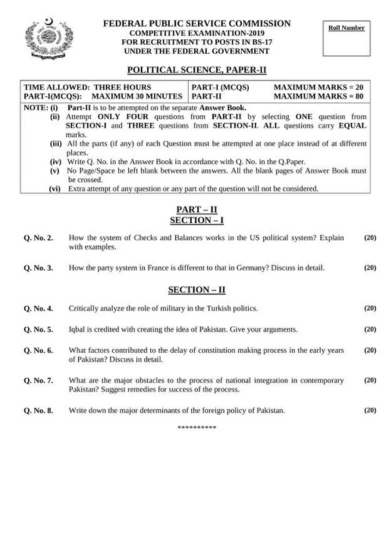Table of Contents
ToggleCSS Political Science Paper 2019 Paper II
SECTION-I
Q. No. 2. How does the system of Checks and Balances work in the US political system? Explain with examples. (20)
Q. No. 3. How the party system in France is different from that in Germany? Discuss in Detail. (20)
Section – II
Q. No. 4 Critically analyze the role of the military in Turkish politics. (20)
Q. No. 5. Iqbal is credited with creating the idea of Pakistan. Give your arguments. (20)
Q. No. 6 What factors contributed to the delay of the constitution-making process in the early years of Pakistan? Discuss in detail. (20)
Q. No. 7. What are the major obstacles to the process of national integration in contemporary Pakistan? Suggest remedies for the success of the process. (20)
Q. No. 8. Write down the major determinants of the foreign policy of Pakistan. (20)
Summary of Questions:
Section I
Q. No. 2. How does the system of Checks and Balances work in the US political system? Explain with examples. (20)
This question asks for an explanation of the system of checks and balances in the United States government, which ensures that no single branch (executive, legislative, or judicial) becomes too powerful. Examples should include how the president can veto laws, how Congress can override vetoes, and how the judiciary can declare laws unconstitutional.
Q. No. 3. How the party system in France is different from that in Germany? Discuss in Detail. (20)
This question requires a comparison of the party systems in France and Germany, highlighting differences in political party organization, electoral systems, and the role of coalition governments. It should explore how these systems reflect each country’s political culture and history.
Section II
Q. No. 4 Critically analyze the role of the military in Turkish politics. (20)
This question asks for a critical analysis of the military’s involvement in Turkish politics, focusing on its historical role in shaping policy, its relationship with civilian governments, and how military interventions have influenced the country’s political stability.
Q. No. 5. Iqbal is credited with creating the idea of Pakistan. Give your arguments. (20)
This question seeks arguments supporting Iqbal’s role in creating the idea of Pakistan. It should explore his philosophical and political contributions, including his speeches, poetry, and vision for an independent Muslim state in South Asia.
Q. No. 6 What factors contributed to the delay of the constitution-making process in the early years of Pakistan? Discuss in detail. (20)
This question explores the factors that delayed the adoption of a constitution in Pakistan, including political instability, regional differences, and challenges in governance. It should analyze the historical context and key events that contributed to the delay.
Q. No. 7. What are the major obstacles to the process of national integration in contemporary Pakistan? Suggest remedies for the success of the process. (20)
This question addresses the challenges Pakistan faces in achieving national integration, such as ethnic, regional, and linguistic divisions. Suggested remedies should include promoting political inclusiveness, economic development, and social harmony.
Q. No. 8. Write down the major determinants of the foreign policy of Pakistan. (20)
This question asks for a discussion of the main factors that influence Pakistan’s foreign policy, including geopolitical location, relations with neighboring countries (especially India and Afghanistan), national security concerns, and its alliances with global powers like the US and China.
